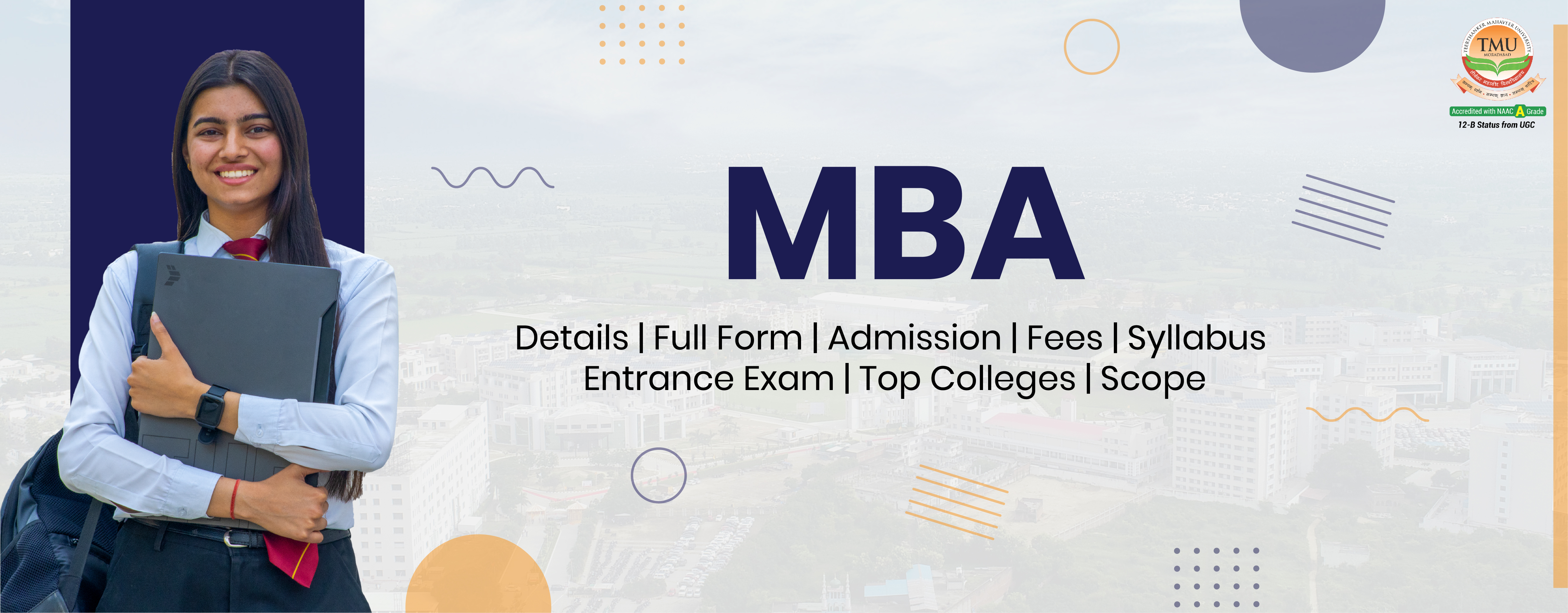MBA Courses: Details, Full Form, Admission, Fees, Syllabus, Entrance Exam, Top Colleges, Scope
Table of Contents
An MBA Course is a postgraduate degree program that offers advanced education in Business and management. The course provides specialisations like Finance, Marketing, HR, and Operations. The duration of this program is two years, divided into four semesters. The curriculum of this course is a mix of management principles and specialised subjects.
An MBA opens up a wide range of career opportunities for graduates in various industries, including banking, technology, healthcare, and media. There are several types of MBA programs available to suit different career paths, including full-time MBA, part-time MBA, executive MBA, global or international MBA, and integrated MBA. You can choose according to your career goal and lifestyle.
To apply for an MBA course, you just need to qualify for the entrance exam, like CAT, CMAT, or NMAT. If you apply for the full-time MBA course, you just need to complete your graduation or bachelor’s degree in any discipline (Arts, Commerce, Science, Engineering, etc.) with at least 50% marks. The entrance exam depends on the institute’s requirements.
Full Form of MBA Course
The full form of an MBA course is Master of Business Administration. It is a two-year postgraduate degree program, divided into four semesters. It is designed to equip students with the knowledge of business and management-related studies. To apply for this course, you have to complete your bachelor’s degree in any stream with at least 50% marks.
Teerthanker Mahaveer University
Apply for Admission
Click Here To Apply for Admission
Overview of an MBA Course
| Aspect | Details |
| Full Form | Master of Business Administration |
| Course Level | Postgraduate (Professional Degree) |
| Duration | 2 years (full-time) / 1–2 years (executive or accelerated) |
| Eligibility | Bachelor’s degree with minimum 50% marks (45% for reserved categories) |
| Admission Process | Entrance exam (CAT, XAT, CMAT, NMAT, SNAP, etc.) + GD/PI/WAT rounds |
| Course Type | Full-time, Part-time, Executive, Online, Distance |
| Core Subjects | Marketing, Finance, Human Resources, Operations, Business Analytics, Strategy |
| Specializations Offered | Finance, Marketing, HR, Operations, IT, International Business, Entrepreneurship, etc. |
| Skills Developed | Leadership, Strategic Thinking, Communication, Decision-Making, Problem-Solving |
| Average Course Fee | ₹4 lakh – ₹25 lakh (varies by institute) |
| Average Starting Salary | ₹8 lakh – ₹25 lakh per year (depending on institute and specialization) |
| Top Recruiters | Consulting Firms, Banks, FMCG Companies, IT Firms, Startups, E-commerce Companies |
| Career Opportunities | Business Manager, Financial Analyst, Marketing Manager, HR Manager, Product Manager, Consultant |
Types of MBA
Full-Time MBA: A full-time MBA is a management degree course that is two years in duration, provided to new graduates and workers. The courses provide classroom training, internships, live projects, and campus placements.
Executive MBA (EMBA): An executive MBA is a two-year degree program, focused on leadership, strategic thinking, and decision-making. The program should be applied to the middle and senior-level managers who have a minimum of 5 years of experience.
Global MBA: The duration of this global MBA course program is 1-2 years. A global MBA provides global exposure and international management experience to students who want to focus on global business practices, cross-cultural management, and international trade.
Integrated MBA: An integrated MBA course is a five-year program. This is a dual degree program that combines undergraduate and postgraduate studies. The program is designed for students who have completed their 12 and want to pursue management studies without subsequent entrance examinations.
MBA Course Syllabus
| Semester | Core Subjects | Elective / Specialization Subjects | Skill / Practical Courses |
| Semester 1 |
| -- |
|
| Semester 2 |
| -- | - Business Environment Analysis - Summer Internship / Project |
| Semester 3 |
| Choose specialization:
|
|
| Semester 4 |
| Specialization continuation:
|
|
Eligibility criteria for MBA Course
Educational Qualification
- You have to complete a bachelor's degree.
- You have to achieve a minimum of 50% in your specialisation.
Entrance Exam
- Most universities require candidates to qualify for the entrance exam to check their eligibility.
- You have to qualify for the national-level management aptitude test or an entrance exam.
- Some of the common entrance exams are CAT, XAT, CMAT, NMAT, SNAP, etc.
Work Experience
- If you are applying for an executive MBA, a minimum of 3-5 years of work experience is required
- Although the university accepts fresh graduates, but institute prefers candidates with at least 1-2 years of work experience.
Age Limit
- There’s no specific upper age limit for an MBA degree program.
- Some institutions have required a minimum age of 21 years for pursuing this course.
Entrance Exam
- CAT: CAT is a common admission test, conducted by the Indian Institutes of Management. This exam is conducted once a year and is a computer-based test. It is India’s most competitive exam for admission to an MBA. The total duration of this exam is two hours.
- XAT: XAT stands for Xavier Aptitude Test, conducted by the XLRI Jamshedpur. It is a computer-based test. This entrance exam is conducted for admission to MBA/PGDM courses. The score is accepted by over 160 other business schools in India.
- CMAT: CMAT stands for Common Management Admission Test. The examination is conducted by NTA ( National Testing Agency ). This is also a computer-based test. The duration of this course is three hours.
- NMAT: NMAT is an NMIMS Management Aptitude Test, conducted by Graduate Management Admission Council. This exam is conducted once a year and is a computer-based test. The duration of this entrance exam is 120 minutes (2 hours).
- Other: There are many other entrance exams conducted for admission to MBA, such as SNAP, IIFT, MICAT, TISSNET AND ATMA (AIMS Test for Management Admissions).
Admission Process for MBA
For admission in the MBA course, you have to follow these simple steps:
Meet Eligibility Criteria
- To apply for admission, first you need to meet the eligibility criteria, such as having a bachelor's degree from a recognised university.
- You need to achieve at least 50% in your graduation.
- If you are applying for an executive MBA, you must have a few years of business experience as a manager.
Entrance Exam
- You will need to qualify for the entrance exam, such as CAT (Common Admission Test), XAT (Xavier Aptitude Test), CMAT, NMAT, SNAP, etc.
- The institute conducted this entrance exam to check student’s quantitative ability, logical reasoning, verbal ability, and data interpretation skills.
Apply for Admission
- Apply for admission online or offline and complete the application process.
- Submit all the required documents such as mark sheet, passport-size photograph, ID proof and resume.
Selection Round
- Shortlisted candidates will get a call for a personal interview and group discussion.
- This institution conducted this round to check student’s ability and communication skills.
Final Admission Letter
- Final admission will depend on your overall performance.
- You will be informed of your admission status, which depends on your performance, including exam score, GD/WAT, PI, academic record, and work experience.
Fee Payment
- Selected candidates will receive an offer letter.
- After paying the admission fee, you can confirm your seat.
Admission Fee for MBA
MBA course admission varies significantly according to the location and university. There are many factors which affect the fee of a course, like a university’s reputation, location, type of program and duration of the course. Here we’re giving you a brief breakdown of the MBA fee, which helps you to get an idea about the cost.
- IIM: IIM stands for the Indian Institute of Management. It is well known as the premier B-school for pursuing an MBA. Only the admission at IIM usually ranges from ₹1 lakh to ₹2 lakh, while the course fee is between ₹20 lakh and ₹30 lakh. IIM is considered the top choice for pursuing an MBA as it offers world-class faculty, top placements, and global exposure.
- Government and Central Universities: Government and central universities are less expensive in providing an MBA course. The government universities cost between ₹10,000- 50,000 in the form of admission fees and 2 lakh to 5 lakh as the total fees. It is an affordable alternative in India to pursue an MBA since it offers quality education at a low cost.
- Private Universities: Private Universities are usually characterized by an open learning setting and a state of the art facilities. The admission cost of the private colleges is usually 25,000 to 75,000. The Amity University, Symbiosis, and Lovely Professional University are some of the privately owned universities.
Top Colleges for MBA Course
| College / University Name | Location | Key Highlights |
| Indian Institute of Management Ahmedabad (IIMA) | Ahmedabad, Gujarat | Case-based learning and a strong alumni network. |
| Indian Institute of Management Bangalore (IIMB) | Bengaluru, Karnataka | Focuses on leadership, entrepreneurship, and global exposure. |
| Symbiosis Institute of Business Management (SIBM) | Pune, Maharashtra | Excellent corporate interface and modern pedagogy. |
| Teerthanker Mahaveer University (TMU) | Moradabad, Uttar Pradesh | NAAC ‘A’ accredited university with 85% placement rate, modern infrastructure, and national & international collaborations. |
| University of Delhi (FMS) | New Delhi | Offers high ROI with low fees and top placements. |
Why Choose TMU for an MBA Course?
Teerthankar Mahaveer University offers UGC approved and NAAC-A-accredited courses. TMU provides an international exposure-oriented curriculum, the presence of senior faculty and quality placement services, securing the future career development. The program has offerings such as practical experience, case-based learning, global qualifications, industry interactions, a student-focused approach and affordable fees.
Career Opportunities after MBA
An MBA course offers a wide range of career opportunities for students. Whether you want to do a job or start a business, an MBA opens numerous opportunities in both. Here’s a short breakdown of some common career opportunities after an MBA:
| MBA Specialisation | Career Opportunities / Job Roles | Average Salary Range |
| General Management | Business Consultant, Project Manager, Strategy Manager | ₹75 lakh – ₹1.3 crore |
| Finance | Investment Banker, Financial Analyst, Portfolio Manager, Risk Manager, Corporate Finance Manager | ₹75 lakh – ₹1.6 crore |
| Marketing | Brand Manager, Product Manager, Digital Marketing Manager, Market Research Analyst, Sales Director | ₹66 lakh – ₹1.25 crore |
| Human Resource Management (HRM) | HR Manager, Talent Acquisition Lead, L&D Manager, HR Business Partner | ₹58 lakh – ₹1 crore |
| Operations Management | Operations Manager, Supply Chain Manager, Procurement Manager, Logistics Analyst | ₹62 lakh – ₹1.1 crore |
| Information Technology (IT) / Systems | IT Manager, Business Analyst, Product Manager, IT Consultant | ₹70 lakh – ₹1.25 crore |
| International Business | Export Manager, Global Business Development Manager, Trade Analyst, International Marketing Manager | ₹66 lakh – ₹1.15 crore |
| Entrepreneurship | Startup Founder, Business Consultant, Venture Capital Associate | Variable (High risk/reward) |
| Business Analytics | Data Analyst, Business Intelligence Manager, Analytics Consultant | ₹70 lakh – ₹1.25 crore |
| Healthcare Management | Hospital Administrator, Healthcare Consultant, Medical Practice Manager | ₹66 lakh – ₹1.15 crore |
| Sustainability / CSR / ESG | Sustainability Manager, CSR Head, ESG Consultant | ₹58 lakh – ₹1.1 crore |
| Public Policy / Nonprofit | Policy Analyst, Program Manager, Development Director | ₹50 lakh – ₹90 lakh |
Conclusion
An MBA is a perfect opportunity for those who want to build their career in the marketing and HR fields. It provides diverse career opportunities in numerous sectors. It provides global exposure to students to work across industries and countries. By taking this course, the students are able to acquire numerous skills such as communication skills, decision-making skills and leadership skills. It is an important investment in your career process and personal growth.
FAQ
Q1. Which is the best MBA course?
Ans. There’s not a single best MBA course. The best specialisation is always based on your personal interests, strengths, and career ambitions.
Q2. Is an MBA course only 2 years?
Ans. Most MBA programs require approximately two years; options are available to individuals who want to have alternative schedules.
Q3. Who is eligible for an MBA course?
Ans. To be eligible for the MBA course, you are required to have a bachelor degree of at least a percentage such as 50 per cent.
Q4. Is an MBA good after 12th?
Ans. Yes, an Integrated MBA course is a good solution for students who are certain about their career goal of moving into management or leadership roles. The duration of this program is 5 years, divided into 10 semesters.















